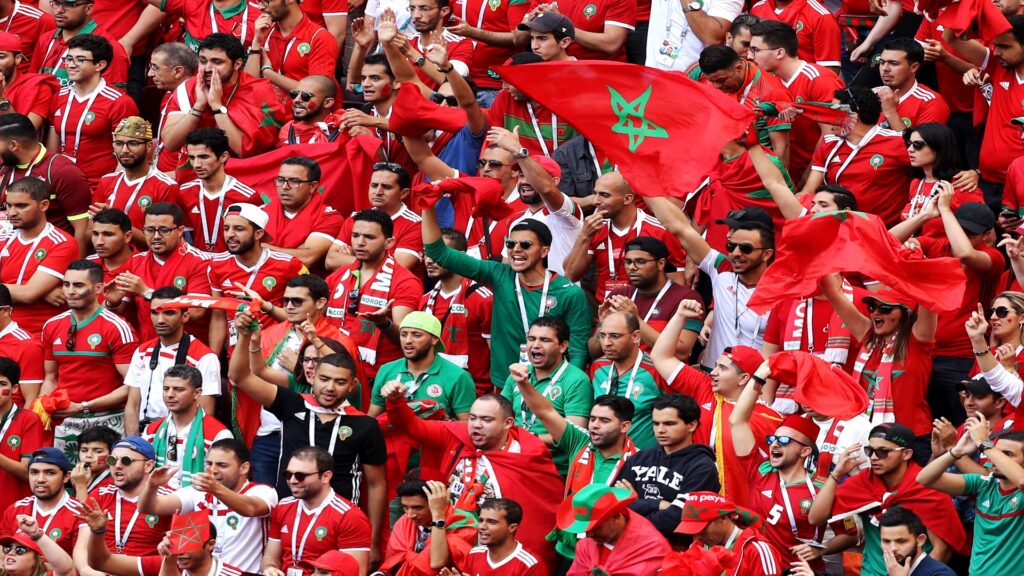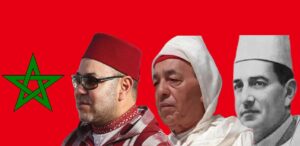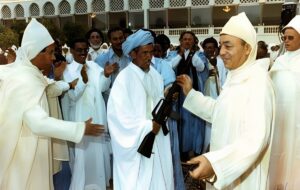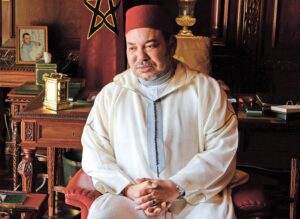Atlas Lions: A winning mentality versus a defeatist culture!!

MOSCOW, RUSSIA - June 20: Moroccan fans during the 2018 FIFA World Cup Russia group B match between Portugal and Morocco at Luzhniki Stadium on June 20, 2018 in Moscow, Russia.(Photo by Maddie Meyer/Getty Images)
Important journeys often launch great careers, and successful battles lead to victorious wars! We say this as the Atlas Lions' journey nears its happy conclusion, whether they finish third or fourth in the World Cup in Qatar. Because it is an exceptional experience by all standards, it will remain a source of inspiration for many communities and countries across the developing world, and will continue to inspire in the Arab and Islamic worlds, the African continent, and beyond.
The Atlas Lions and their captain Walid Regragui have mastered their football battles on the pitch, as well as their mastery of the battle of image and symbol on social media. In their second battle, they were aided in particular by the unparalleled support they received from millions of activists, influencers, and ordinary people on these platforms. The symbolism associated with the name “Atlas Lions” and the values they reflected in their first battle—self-confidence, determination, persistence, assertiveness, faith, and other values—have become a trademark of the entire Moroccan people, as well as of the Arab, African, and Islamic peoples. This is summed up under a broad slogan that has spanned the globe from East to West: The impossible is not Moroccan!
The intelligent management of the process of activating the local value system, and its successful use in the football battles fought by the Moroccan champions, even if they seemed far from it, made this experience a model that can be inspired by peoples who share with Morocco traditional ties (language, religion, history, conscience, etc.) or cultural circumstances (economic status, progress, location on the world map, etc.). For the first time, players brought their mothers to be with them in hotels and stadiums (it is customary in the West for players' wives and girlfriends to be invited), which is in line with the place of mothers in Moroccan, Arab, and Islamic popular culture in particular. This humanitarian gesture attracted tens of thousands of people from other nations attending the World Cup, and was greatly appreciated by the masses who took it up; Hakimi's kisses on his mother's head, and Boufal's dancing with his mother, captured the attention of millions of social media users in the West before in the East. They enriched Moroccans' lives by revealing the humane sophistication of their local culture, which needed no translator to convey its meanings.
The concepts of “intention” and “blessing,” among others, were presented in dozens of sermons in mosques, and demonstrated the extent of this people’s adherence to their Islamic cultural and civilizational depth. The most beautiful thing is that they were spoken by many players who were born in the diaspora and do not speak Arabic well at all, forming an eloquent response to those who despise popular culture among advocates of modernity and enlightenment, especially since they were employed in a way that is far from “dervishness,” and even within a very contemporary framework, to demonstrate the extent of the futility that has wasted the time and energy of Arabs and Muslims in this imaginary battle (modernity and authenticity).
The most prominent phenomenon of the World Cup, one that has preoccupied, continues to preoccupy, and will continue to preoccupy observers and analysts for years to come, is the hysterical joy and insane love with which Moroccans, Arabs, Muslims, Africans, and even the rest of the developing world in Asia and Latin America have surrounded the Atlas Lions. We are not so naive as to attribute this to a single cause, or treat it as a passing phenomenon. Quite the contrary: it is a profound, deeply rooted, and multifaceted phenomenon. Here, we will limit ourselves to focusing on one reason that may help shed light on this love and pride in the Atlas Lions, which is what we mentioned in the title: The Mentality of Victory and the Psychology of Defeat. Since the wave of joy that swept through all colonized countries (with a fatha on the m) after they gained independence, and which was renewed - to varying degrees - whenever independence included sister or friendly countries from the Third World in the middle of the last century, the people of these countries were not destined to be proud and happy about a civilizational achievement in any field, including international sports. Military, economic, sports and intellectual victories remained the monopoly of their former colonizers, and our local elites, linked to the culture of the colonizers (with a kasra on the m), worked hard to “perpetuate” our sense of defeat and confirm the impossibility of surpassing our old “masters” in any of these fields, to the point that being satisfied with crumbs of achievements and what is marginal among them became our greatest ambition, such as qualifying for the second round in the World Cup, or losing by less than two goals to the “masters of the game”!! Therefore, millions of Arabs, Muslims and Africans did not view the achievement of their Moroccan brothers as merely a sporting victory on the football field, but rather as proof of the ability of the Arab (and I mean language, not race), Muslim, African and even Third World people to achieve victory, after believing in themselves and preparing the appropriate equipment. The millions of throats that cheered, and the bodies that swayed to Hakimi's penguin dance after the elimination of the Spanish national team, or jumped higher than En-Nesyri when he scored against Portugal, were a conscious reaction of defeated psyches, in the face of a true moment of victory, “generations have grown old in order to witness this moment”!!!
Perhaps what confirms that Moroccans do not monopolize this victory is the celebration of various peoples across the Arab and Islamic worlds by raising the Palestinian flag in Qatari stadiums and arenas, out of their belief in the “injustice” of this people and the legitimacy of their longing for liberation. This was what the players on the green field and the fans in the stands were keen to maintain, realizing that the officials of this global forum are the address through which, with the help of their present media, the Palestinian humanitarian message can be conveyed to their peoples and governments. Here, it was no coincidence that the phenomenon of “raising the Palestinian flag” began timidly in the first round, to gain momentum as the representative of Arabs, Muslims and Africans, the Moroccan national team, moved from one victory to another, confirming what we have stated about linking this practice to successive victories.
In conclusion, we hope, with all hope, that the youth of Morocco, and behind them the youth of this geography extending from Rabat to Jakarta, will continue to work with the mentality of victory and take the necessary steps to achieve it, so that we can celebrate with them one day the dissipation of the clouds of defeat that have always loomed over our skies since independence!!





